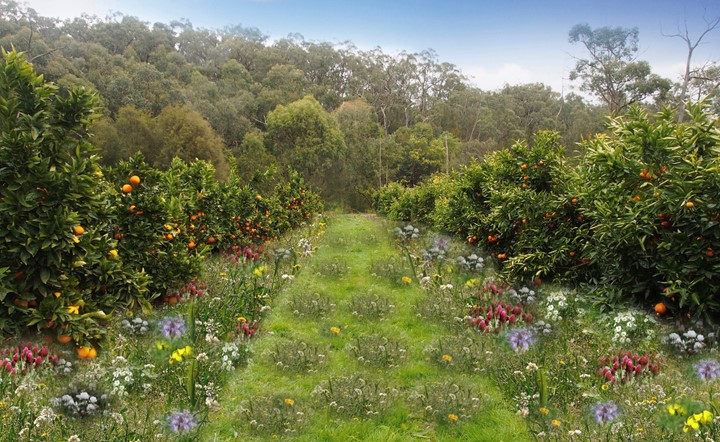A new Summerfruit NZ project in Central Otago is taking knowledge gained from A Lighter Touch work on beneficial planting in Gisborne citrus orchards and applying it to summerfruit crops.
The first plantings for the Summerfruit NZ-sponsored project went in the ground in autumn on an apricot orchard in Roxburgh. Spring plantings on cherry orchards in Cromwell will follow later this year, and there is capacity in the project to also extend to orchards in Hawke’s Bay.

Early growth of the first under-canopy planting at the Roxburgh apricot orchard, showing a mixed pasture species – grasses, legumes and other forbs. Photo credit Richard Mills.
This A Lighter Touch-partnered project will leverage knowledge gained from the Gisborne citrus project where beneficial plantings were established to enhance biodiversity and natural predator populations.
There are some key differences from the citrus project however. Summerfruit is deciduous, and has different pests and diseases, harvest timings, and orchard management approaches. Understanding how to incorporate under-canopy plantings into the orchard system will be a key aspect of the project.
For Summerfruit NZ, the motivation for this work is not only about enhancing the abundance of beneficial insect populations, but also to examine whether other associated benefits can be achieved. These co-benefits include:
• weed management, leading to fewer herbicide applications;
• improved botrytis disease control by planting and covering bare ground; and
• improvements to soil health through the rootzone activity of these plantings and incorporation of additional organic matter back into the soil.
From an ALT perspective, A Lighter Touch was established to support plant-based food producers to move from agrichemical pest management to agroecological crop protection. Projects like this and the Citrus work are about practically demonstrating how to enhance biodiversity by growing selected plants that provide SNAP (shelter, nectar, alternative food sources, and pollen) for beneficial insects which will help control insect pests.

An illustration of beneficial under-canopy planting in the ALT citrus project in Gisborne.
While this biological approach to controlling insect pests is not new, it has not been widely adopted by many fruit crop producers due to a lack of knowledge and a clear pathway to follow. This Summerfruit project is about providing growers with the knowledge and tools they need.
New Zealand Apples and Pears also has work underway in this space, with a project looking at using ground cover plants to outcompete weed species under apple and pear trees, therefore eliminating the need for herbicide use in orchards. This work, supported by the Rural Professionals Fund, is running in Nelson orchards. The A Lighter Touch team is keeping abreast of the project, having visited the site and shared ideas with A&P staff.
While some sectors are developing their knowledge around the use of beneficial planting in their crop protection practices, others have a wealth of experience and knowledge to share. The viticulture sector, which partners in the A Lighter Touch programme through their research centre, Bragato Research Institute, has been utilising mid-row planting of beneficial cover crops for many years. These techniques have been adopted by organic and conventional growers for a variety of benefits, including encouraging beneficial insects to help control insect pests, weed management, building up organic matter in soil and fixing nitrogen.
